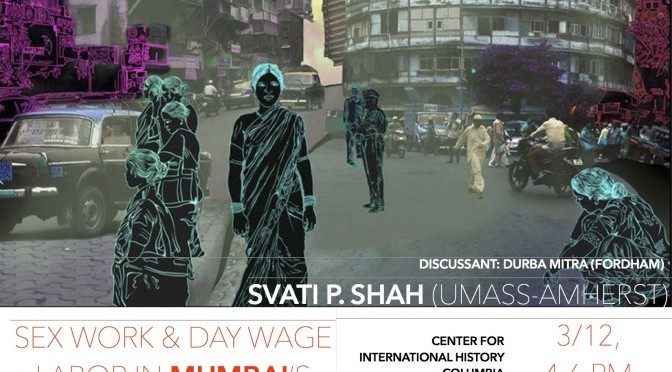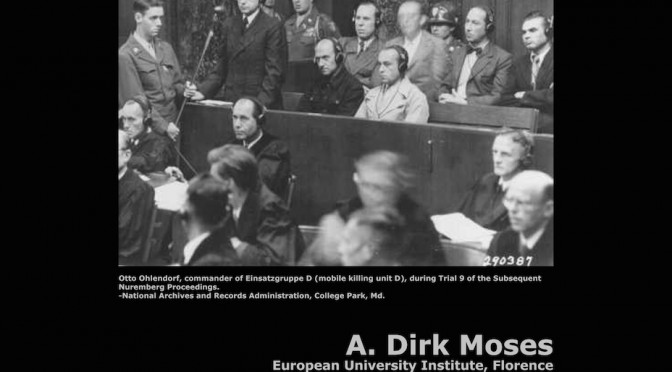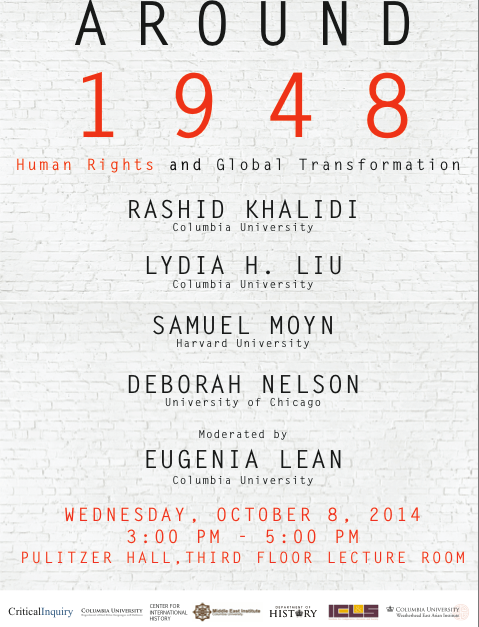Department of History, Columbia University, New York


• “How and Why Did Genocide Become a Non-Political Crime” by A. Dirk Moses (Professor of Global and Colonial History (19th-20th centuries), EUI)
Tuesday, September 23rd
4:00PM to 6:00PM, 411 Fayerweather
International law distinguishes between political and the non-political crimes in the following way: racial hatred is defined as non-political because victims are attacked for who they are: for their identity. Genocide cannot occur where a victim group has agency, as in, say, launching an insurgency, because such action implies politics. This conception of genocide as a non-political, mass hate crime is modeled on the Holocaust of European Jewry, meaning that Holocaust memory intersects in important ways with the humanitarian intervention agenda. To galvanize the “will to intervene,” human rights activists must make contemporary civil wars resemble the Holocaust by casting civilians as victims of murderous racial persecution: for who they are rather than for what some of them may have done. The spurious distinction between racial and political intentions—the depolicitization of the genocide concept—lies at the heart of the relatively new field of genocide studies and its older sibling, Holocaust studies. One consequence is the promotion of toleration as genocide’s antidote. Another is that genocides are misrecognized, as in the case of the UN Darfur report in 2005. In this paper, I explain how and why this distinction was constructed by revisiting the contingent origins of the genocide concept. My discussion mainly concerns two moments in the second half of the 1940s when it was crystallized in international law and the postwar imagination: 1) the latter Nuremberg Trials; and 2) the concurrent UN Debates about the Genocide Convention.

Leading scholars Rashid Khalidi, Lydia H. Liu, Samuel Moyn, and Deborah Nelson discuss the advent and the global impact of the 1948 Universal Declaration of Human Rights. Moderated by Eugenia Lean.
Panel Discussion
“Around 1948: Human Rights and Global Transformation”
Rashid Khalidi, Edward Said Professor of Modern Arab Studies, Columbia University
Lydia H. Liu, Wun Tsun Tam Professor in the Humanities, Columbia University
Samuel Moyn, Professor of Law and History, Harvard University
Deborah Nelson, Associate Professor of English, University of Chicago
Moderated by Eugenia Lean, Associate Professor of Chinese History, Columbia University
Wednesday, October 8
3:00 PM – 5:00 PM
Pulitzer Hall, Third Floor Lecture Hall
No registration required.
Co-sponsored by the Center for International History, Critical Inquiry, the Department of East Asian Languages and Cultures, the Department of History, the Institute for Comparative Literature and Society, and the Middle East Institute
As part of the 1949 UNESCO Human Rights Exhibition seminar series, the Institute for the Study of Human Rights is proud to present
Visual Culture of Human Rights
A Conversation with Thomas Keenan, Associate Professor of Comparative Literature; Director, Human Rights Program, Bard College
Date and time: Thursday 7 November 2013 at 6.15pm
Location: Second Floor Common Room, Heyman Center for the Humanities, Columbia University (see directions here)
In a conversation with Thomas Keenan we will explore the historical and contemporary visual culture of human rights by drawing comparisons between UNESCO’s Human Rights exhibition from 1949 and the Family of Man exhibition from 1955. Questions will be raised about the role of images in giving meaning to the idea of human rights, be they linked to triumphant narratives, depictions of suffering, or acting as evidence.
This is the second event in a seminar series revolving around the largely unknown 1949 UNESCO Human Rights Exhibition – the first international event that sought to visually represent the history, meaning and content of the rights set out in the UDHR. The series will lead up to a new display of the exhibition archive at Columbia’s Buell Hall Gallery in April 2014. For more information, visit www.exhibithumanrights.org.
This seminar series is made possible with the support of the Institute for Comparative Literature and Society, the Center for International History, and the Center for Human Rights Documentation and Research.
The event is free and open to the public with limited seating offered.
If you cannot join us on October 30th for the conversation with Judith Butler and Cornel West titled, Palestine and the Public Intellectual: Honoring Edward Said, we invite you to watch the event on live-stream. We will begin at 7:15PM (Eastern). Please follow the link to tune-in:
Livestream: http://www.columbia.edu/cu/palestine/programs/featuredevent.html#livestream
Unfortunately, this event has been fully booked and registration is closed.
For those that have registered, please remember that registration does NOT guarantee entrance to the event and seating is on a first-come, first-seated basis.
We hope that you tune-in.
Judith Butler and Cornel West, in Conversation
Palestine and the Public Intellectual: Honoring Edward Said
On the Tenth Anniversary of Edward Said’s passing, renowned scholars Judith Butler and Cornell West will discuss what it means to be a public intellectual and Edward Said’s impact on the academic discourse of Palestine.
Introduction
Lila Abu Lughod, Director of the Middle East Institute and Professor of Anthropology & Gender Studies, Columbia University
Moderator
James Schamus, Professor of Professional Practice, School of the Arts, Columbia University
Judith Butler is a leading scholar in the fields of ethics, political philosophy, feminist philosophy and queer theory. Visiting Professor of the Humanities at Columbia University and Maxine Elliot Professor in the Department of Comparative Literature and the Program for Critical Theory at the University of California, Berkeley. Butler is the recipient of the Mellon Award for Distinguished Scholarship in the Humanities. Author of many influential books from Gender Trouble to Precarious Lives, her most recent book is Parting Ways: Jewishness and the Critique of Zionism. She is active in gender and sexual politics and human rights, anti-war politics, and a board member of Jewish Voice for Peace.
Cornel West is a prominent academic and provocative democratic intellectual, activist, and author. Professor of Philosophy and Christian Practice at Union Theological Seminary, he is emeritus from Princeton University. West has written 20 books on the subjects of race, gender and class in America including the influential Race Matters. Co-host of the popular radio show “Smiley & West” and co-author of a new book titled The Rich and the Rest of Us: A Poverty Manifesto, West keeps alive the legacy of Martin Luther King, Jr. – a legacy of telling the truth and bearing witness to love and justice.
All attendees must RSVP and bring a photo ID. This event is free and open to the public. Seating is on a first-come, first-seated basis.
Sponsored by the Center for Palestine Studies (CPS) with the generous support of the Institute for Research in African American Studies (IRAAS) and the Anthropology Department, as well as the Middle East Institute (MEI), Heyman Center for the Humanities, Institute for Research on Women and Gender (IRWAG), Center for International History (CIH), Center for the Study of Ethnicity and Race (CSER) and the Institute for Comparative Literature and Society (ICLS).
October 30, 7PM (doors open at 6PM)
Low Library Rotunda (Enter gates on 116th & Broadway or Amsterdam Avenue)
Columbia University
RSVP Required (Registration Closed)
As part of the 1949 Unesco Human Rights Exhibition seminar series, the Institute for the Study of Human Rights is proud to present
The Human Rights Restoration-Revolution, a talk by Dr. Marco Duranti (Lecturer in Modern European History at the University of Sydney).
Discussant: Samuel Moyn (James Bryce Professor of European Legal History, Columbia University)
Date and time: Wednesday 2 October 2013 at 6.15pm
Location: Second Floor Common Room, Heyman Center for the Humanities
With Unesco’s 1949 Human Rights Exhibition as its point of departure, this talk will consider the historical moment of the so-called “human rights revolution” in the late 1940s. Dr. Duranti’s analysis of the forces that first championed human rights invites a reflection on how far this moment should be considered revolutionary in the first place. Instead, Dr. Duranti suggests that the human rights became a means of rearticulating discredited political agendas in postwar Europe, and thus the moment in question may have constituted as much a restoration as a revolution.
This is the opening lecture in a new seminar series revolving around the largely unknown 1949 Unesco Human Rights Exhibition – the first international event that sought to visually represent the history, meaning and content of the rights set out in the UDHR. The series will seek to explore the exhibition’s themes through the research of human rights scholars from various disciplines in an open and interactive setting, leading up to a new display of the exhibition archive at Columbia University’s Buell Hall Gallery in April 2014.
Dr. Marco Duranti received his PhD from Yale University in 2009 and now teaches history at the University of Sydney. He is currently writing a book on the genesis of European human rights law for Oxford University Press.
This seminar series is made possible with the support of the Institute for Comparative Literature and Society, the Center for International History, and the Center for Human Rights Documentation and Research.
The event is free and open to the public with limited seating offered. Find directions here.